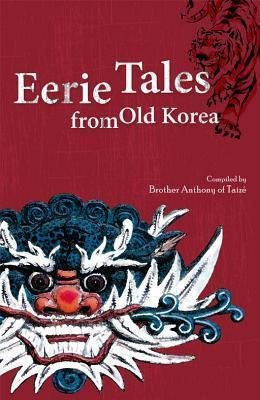Eerie Tales from Old Korea. Compiled by Brother Anthony of Taizé. Seoul Selection, 2013.
In the decades before and after Lafcadio Hearn collected and published a number of Japanese eerie tales under the title Kwaidan: Stories and Studies of Strange Things, there were Westerners in Korea who also felt a hunger for the spooky and fantastical. Eerie Tales from Old Korea collects a selection of tales compiled by two such individuals: a pair of Christian missionaries named James Gale and Homer B. Hulbert. As the compiler of the collection, Brother Anthony of Taizé notes in his introduction, both men had to spend a lot of time inquiring frustratedly after “ghost stories”: the Confucian scholars they spoke to were reluctant to share tales with any overtly Buddhist, Taoist, or supernatural content. However, both men did persist, and managed to publish collections of tales in the first and second decades of the 20th century.
The tales are a mix of ghost tales, monster stories, and other weird tales, which fell broadly into the category of the yadam or what is called in modern literary circles in English: the “weird tale.” Ghosts turn up quite a bit, but so do figures like Jeon Woochi, the famed wizard mentioned in the first installment of this series, and occasional weird monsters and creatures of other kids. Still, a fair number of the tales feature ghosts, and as Brother Anthony points also out, it’s because of this that the formal and old-fashioned style of their rendition in English seems not out of place, but perfectly apt for the subject matter. (If you’re familiar with the work of English ghost-story master M.R. James, it’s a little reminiscent of that.)
The book can be inspirational for your game in a number of ways. For one, it’s good to have a repository of folktales on hand: you can pass the book to your players and tell them, “These are the kinds of stories your characters would have grown up hearing: read a few and pass it on to another player.” The tales are short and easy to read, and with players who are willing to do a little reading for the game, the book can easily serve as a kind of shortcut to developing a shared folklore for your own particular Jeosung—something that is even more handy when you consider that folktales are a mix of truth and fantasy: not everything in the stories needs to be literally correct in your setting, after all, and it can be a fun challenge for players to work out how to sort the wheat from the chaff.
Likewise, if you’re looking for adventure seeds, a lot of these stories can certainly provide inspiration. Of course, there’s a trick to it: as a GM, you’ll want to always start with the question, “So, what do things look like thirty (or fifty, or a hundred) years later?” or “How might this work out differently if, instead of the characters in the original tale, my player’s characters were thrust into this situation?” If you’re careful to extract the scenario from the tale, while leaving aside the plot, you’d be well on your way to planning adventures that have a specifically Korean (and thus, specifically Jeosung) flavor to them. In this book’s pages you’ll find ample adventure seeds and ideas for adventures to throw at your players.
But, finally, I think it’s also handy for a GM to just read the book to sort of soak up the flavor of the world and worldview of traditional Korean folktales, and of the world that Korean folktales sprang from. Reading this book is a quick and easy way to infuse a little of Old Korea into your mind, hinting at the kinds of conflicts, concerns, and situations that preoccupied people there, and which would very much be fitting to a Korean-flavored fantasy setting.
You can find Eerie Tales from Old Korea on Amazon.
on Amazon.
